
Lots
of boats come to Oriental, some tie up at the Town Dock for
a night or two, others drop anchor in the harbor for a while.
If you've spent any time on the water you know that every boat
has a story. The Shipping News on TownDock.net brings you the
stories of the boats that have visited recently.
Monday, May 28, 2007
Pelican - Pete Hill
On March 6th Pete Hill pulled away from the Town Dock, bound for Brazil and then South Africa on board "Pelican", the Freedom 33 he'd bought late last year in Oriental.
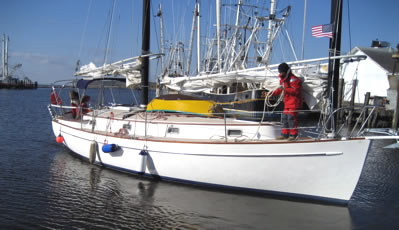
Just as Pete's stay in town had been a quiet one -- he spent endless hours working on "Pelican" -- so too was his departure. There was little in the way of fanfare.
Yet this voyage would be his third major ocean passage in just over a year and "Pelican" the fourth boat Pete owned in that time.
The first of the four boats was "China Moon" a 38-foot catamaran Pete spent three years building in South Africa. He outfitted her with a junk rig, a style he says he likes for being "low tech" and "versatile."
Pete, a native of Lancashire, England, has been living on boats for more than thirty years and sailing junk rigs the majority of that time. His name is almost synonymous with junk rigs. So it was only natural that this catamaran would also have the Chinese sails.
What is it about them that has him putting junk rigs on his boats? "They're extremely easy to reef," Pete says, " and work well off the wind. You can tack thru 100 degrees, almost."
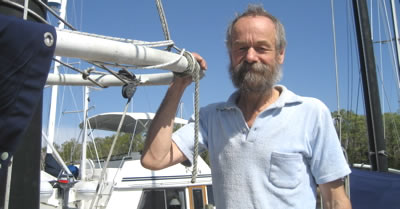
Pete and " China Moon" took off from Cape Town in March of 2002 and headed northwest in to the Atlantic. He sailed to Brazil, explored other coastlines in South America, taking the thin wood catamaran in to the icy waters of the Magellen Strait and Cape Horn. He sailed back to South Africa, then back to South America and then headed north.
By 2005, he was in the Chesapeake Bay and less enamoured of "China Moon."
It wasn't the junk rig.
It was that the catamaran had too many hulls.
"The boat was too big," Pete says. While having too much space on a sailboat is a scenario few have encountered, Pete didn't see it as a benefit. Sailing solo, he found that he could do all his living in just one of the hulls and from that perspective, the other hull was just something unnecessary that he had to maintain. "I didn't have enough money, " he notes, "to run it properly."
So he put "China Moon" up for sale, and set his mind to smaller monohauls. In particular, he was looking for a boat under 30 feet so that he could enter the 2006 Jester Challenge.
The Jester Challenge evolved from the first single-hander trans-Atlantic races that began almost 50 years ago. In 1960, the first race from England to New York was won by Sir Francis Chichester's Gipsy Moth II. Coming in second in that race, was a 25-foot junk-rigged Folkboat named "Jester". The races were run every four years and "Jester" was in all of them, until sinking in 1988 off of Nova Scotia; a replica took part in the races until 1996. But the race had changed and at some point, Pete Hill says, they stopped allowing boats under 30 feet.
All of which was the inspiration for the Jester Challenge. It's a trans-Atlantic race -- but not really a race, Pete notes -- for the more humble under-30-foot boats. Pete Hill says says he first learned of the Jester Challenge while sailing a few years ago in Bermuda. The double appeal to Pete Hill seems obvious -- a race named after a boat with the junk-rig he so liked, and crossing the Atlantic in a small boat with no wasted space.
In the Chesapeake Bay area in 2005, Pete bought -- "cheaply" he says -- a 27-foot boat to race in the Jester Challenge figuring he had plenty of time to prep it for the start in June 2006.
But then a buyer came through for "China Moon".
Normally, selling a boat you didn't want would seem to remove one complication from life.
Thing is, the boat buyer wanted to know if Pete could deliver the boat.
To Tasmania.
So, he set off for the island off the southern coast of Australia and arrived there with "China Moon" around Easter of 2006.
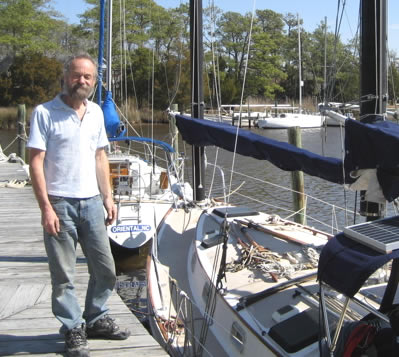
The Jester Challenge was less than two months away. As Pete puts it, the boat delivery meant that he was "losing the plot.".
There was no time to go to the Chesapeake and get the boat to England in time for the start of the race.
So -- and this is where Boat Number Three comes in -- he bought, sight unseen, a 22-foot Kingfisher already in England. He flew there from Tasmania and went from owning a catamaran with two hulls, to a monohull with two keels. It was he says, "a tubby cruiser."
He had six weeks to prepare "Shanti". "I was working like an idiot, getting it ready" for the race, he says.
The Jester Challenge began on June 4th. 14 boats had signed up. About 10 set out from Plymouth, England. One of the boats, Pete recalls, dropped out after a few minutes, the captain of that boat promptly proposing marriage to his girlfriend. Most of the other boats fell away from the race in coming weeks because of the nasty weather in the North Atlantic.
Pete, on the other hand, had taken a more southerly course toward the Azores and kept away from the storms and the fog. In the end, he was one of only two boats that made it to Newport. The winner -- a 30-foot racing boat -- took 32 days. Pete arrived in Narragansett Bay 11 days later.
And so there he was, as Pete says, "in America with two boats." Boats have been his home since the mid-70s' but he didn't want to live on either of them. He put them up for sale and looked for a somewhat bigger boat to live on, one that he could easily make in to a junk rig. He found a Freedom 33. It was a two-masted catboat, not a catamaran, and importantly for Pete, its carbon fiber "masts were in the right place" for a junk rig conversion.
And that's why he ended up in Oriental late in 2006. He bought the Freedom 33, the "Kathleen C" , which many passersby at Triton Cove Marina and Sailcraft may recall seeing on the hard for some time.
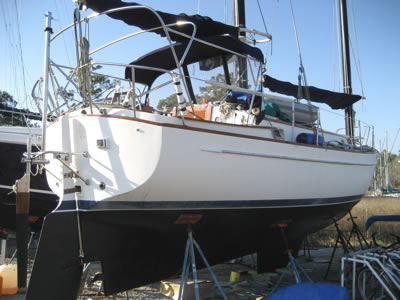
But he couldn't just put her into the water and sail away. There was that matter of the soggy balsa core.
One solution might have been to take the outer skin off, install new balsa and recore and fair it. Or one could take out the interior, section by section, remove the soggy balsa and glass it over. The second solution takes more time, and tearing up of the boat, but the more thorough job is what Pete opted to do. He worked from sun-up to sun-down for weeks, taking on the job in sections. He got the nav station and the quarterberth areas done but a clock was ticking. His visa was running out.
His plan had been to do it all the re-coring in Oriental, but a few months earlier, Pete was told by US authorities in Bermuda that he couldn't extend his visa beyondl mid-March. So, with the work only partially done, he had no choice but to put her in the water. On March 5th he took the boat, now renamed "Pelican" out for a test sail in the Neuse. The boat did well, the self-steering performing nicely. The next day, he left from Oriental's Town Dock for Morehead City and then for Brazil where he plans to spend some time and then South Africa which he aims to reach in about six months.
With him for that first leg of the trip to Morehead City was Shirley Carter, who herself has been living aboard and single-handing a 25 foot Virtue (story upcoming) that was in Oriental this winter. Shirley had known Pete when he was building his catamaran and they'd left South Africa the same day -- on their separate boats -- in 2002, almost five years to the day before Pete was leaving the Town Dock on his way back to South Africa.
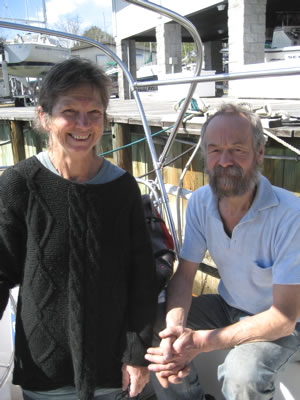
Pete doesn't know how long he will keep "Pelican" after reaching South Africa, but says he does aim to finish the work on her because, "it always feels important that if you start something you should finish it."
Renovating boats is something new to Pete. Boat work, however, is not. "Normally I build my own boats," he says during a break from his preps a few days before leaving Oriental.
"If there's any trade I've had at all," he guesses, "it's boat builder." He understates the case. Some of the boats he's built-- and the voyages taken on them -- have been rather notably chronicled.
His former wife, Annie Hill, wrote about them in "Voyaging on a Small Income" a bible for cruisers on a budget. Later she wrote "Brazil and Beyond" about their travels on Badger, a 34-foot sailing dory that Pete had built of plywood from a Benford design. The cover of one edition of that book shows Badger's two distinctive black junk-rigged sails, wing and wing.
Pete's been living on sailboats-- or working on them -- since the mid-1970's. He's noted some changes among cruisers. Ten to fifteen years ago, most of those cruising were retirees. Now he notices more "early retirees" dipping in to that lifestyle temporarily, doing a sabattical" and then going back to land.
As someone whose lifestyle of living simply and cheaply has been the subject of a book, he says he still sees "people living on a shoestring". But he adds, there are "definitely less" of them. Even among younger cruisers, he says, he detects less inclination to go off cruising , "if they can't have the perfect cruising boat."
Paying for such a boat -- if it exists -- means having to make more money and putting off the departure.
Pete Hill's counsel is to "do it now." That might mean, he allows, some discomfort, but "The only thing money does is make you more comfortable,"
For the record, he defines discomfort as being "cold and wet and frightened." And he says that yes, in his three decades of living on boats, he has exerienced all of that, often at the same time. But he doesn't dwell on it.
He carries the idea of self-sufficiency and simplicity a long way. His boats have had very little in the way of electronic gear, for monetary as well as philosophical reasons. In crossing the Atlantic last summer, he didn't even have a VHF radio; friends waiting for him in Newport only learned he'd arrived in Narragansett Bay as he was passing their boat. And Pete says his boats won't carry an EPIRB, either. "If you're going sailing for pleasure, should you expect someone to risk their life to save you?" he asks. "Who's going to pay for it? People seem to regard it as their right to be rescued."
Pete has given his boat a name from a much earlier, pre-EPIRB era. He says he named it "Pelican" for the "historical connection to Francis Drake."
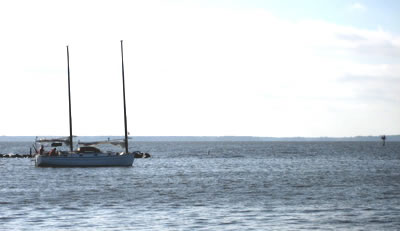
"Pelican" was the name of the boat in which Drake set out from England in 1577. In 1580, he returned in the same vessel, the second captain --after Magellan -- to circumnavigate the world. But the history books don't record "Pelican" as the boat making that triumphant return, because Drake had renamed her "Golden Hinde" after maneuvering past Cape Horn.
In effect, Pete's renamed his boat for a boat that was renamed. Or a boat that was famous for not being famous. There is something quirkily humble in that, rather like the way Pete talks about his decades of sailing. Consider just his past year of travels to Australia, then across the Atlantic and now on to Brazil and South Africa. He is resolutely modest about it, as though, for example, delivering a boat to Tasmania were akin to chugging down the ICW to Charleston.
So, in all those years of living on boats, did he ever follow in Drake's trail, and circle the globe? Pete says no, that he's never had a "burning desire to do a circumnavigation". He's been drawn to this life at sea, because he says, "there're not a lot of the pressures of modern life." and concerns are reduced to "keeping the boat seaworthy."
"You eat and look after your boat." he says.
"It's the best way to live as your own master."
posted 5/28/2007 02:18:00 PM
|
If
you have news of a boat -- sail boat, trawler, kayak, anything that
floats -- that's come to Oriental, drop us a line here at news@towndock.net
|
|






